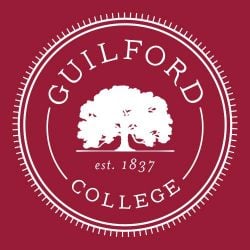Guilford Edge set to shake up schedule

Through the development and implementation of a new program called the Guilford Edge, faculty members and the senior team are working to create a better experience for students.
This year, President Jane Fernandes made the Guilford Edge a priority.
“We are privileged, in this pivotal year, to be leading and guiding a transformation of our education to assure a future of purpose and authenticity,” wrote Fernandes in an email to faculty and staff.
Fernandes believes that this transformation will occur with the implementation of the Guilford Edge.
“Guilford College has designed a distinctive, cross-disciplinary, and highly collaborative experience that enables students to engage at a high level with real-world problems as they refine their personal and life goals and begin to pursue their post-college aspirations,” reads the mission statement of the Guilford Edge on its website.
This mission statement is divided into four parts, which include teaming for success, rallying campus spirit, incorporating ethical leadership and learning collaboratively. These goals will result in changes such as altering the academic schedule, holding campus spirit events to promote community involvement and helping students become strong ethical leaders.
“I have emphasized the urgency of this work from the beginning, and its necessity has been heightened by student retention challenges,” wrote Fernandes.
Guilford’s total student retention rate fell from 80 percent in the 2015-16 academic year to 77 percent in the 2016-17 academic year. The College’s first-year retention rate fell from 74 percent in the 2015-16 academic year to 67 percent in the 2016-17 academic year.
The Guilford Edge has been designed to attract and retain more students and has incorporated faculty input. For example, Professor of Foreign Languages Dave Limburg suggested bringing back January term and making student participation in this program a requirement.
“I think there are many of us (faculty and students) who really liked the (January term) and got a lot out of it,” wrote Limburg.
Another suggestion came from Assistant Professor of Art Mark Dixon, who recommended removing the SAT from application profiles.
“The SAT does not capture important qualities in an incoming student: creativity, tenacity, resourcefulness, compassion, curiosity, values, the inner light and intelligence that are present in different ways in all people,” wrote Dixon.
Other faculty members suggested changing Guilford’s academic calendar to a 12-3 schedule, which would include short 3-week mini semesters before the longer 12-week semesters.
The first stage of the Guilford Edge will be implemented in fall 2018, with full and final implementation expected by fall 2023. The total cost of the program is unknown, as it is still in the beginning stages of development.
“This is a very important time for the College and an exciting opportunity to reposition ourselves for the future,” wrote Fernandes. “I remain open to any and all proposals, especially on collaborative learning, that are transformational in scope.”
More information about the program is available on the Guilford Edge website. The website also allows users to suggest their own “bold ideas” and speak directly to Guilford Edge team members.
“Our way forward doesn’t involve a single solution, but rather the interdependent and dynamic interaction among four major themes,” wrote Fernandes.








